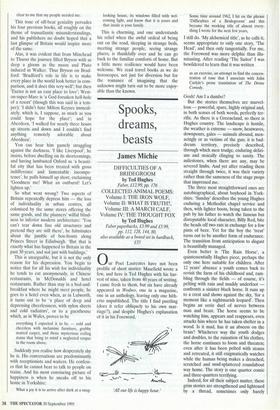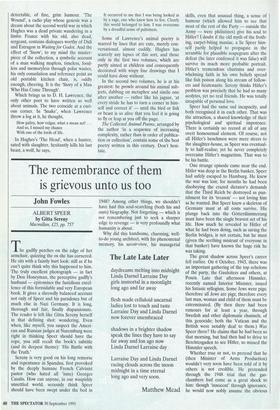Spooks, dreams, beasts
James Michie
DIFFICULTIES OF A BRIDEGROOM by Ted Hughes Faber, £12.99, pp. 176 COLLECTED ANIMAL POEMS: Volume I: THE IRON WOLF, Volume II: WHAT IS TRUTH?, Volume III: A MARCH CALF, Volume IV: THE THOUGHT FOX by Ted Hughes Faber paperbacks, £3.99 and £5.99, pp. 112, 128, 144, 80, also available as a boxed set in hardback £35 0 ur Poet Laureates have not been prolific of short stories: Masefield wrote a few, and here is Ted Hughes with his har- vest of nine, taken from 40 years of writing. I came fresh to them, but six have already appeared in Wodwo, one in a magazine, one in an anthology, leaving only one hith- erto unpublished. The title I find puzzling (does it refer obliquely to his own mar- riage?), and despite Hughes's explanation of it in his Foreword, All our life is happy holm'
Some time around 1962, I hit on the phrase `Difficulties of a Bridegroom' and this became the working title of almost every- thing I wrote for the next few years,
I still do. 'My alchemical title', as he calls it, seems appropriate to only one story, 'The Head', and then only tangentially. For me, the Foreword was more delphic than illu- minating. After reading 'The Suitor' I was bewildered to learn that it was written as an exercise, an attempt to find the concen- tration of tone that I associate with John Carlyle's prose translation of The Divine Comedy.
Gosh! Am I a dumbo?
But the stories themselves are marvel- lous — powerful, spare, highly original and, in both senses of both words, perfectly ter- rific. As there is a Greeneland, so there is Hughes country. The landscape is hostile, the weather is extreme — snow, heatwaves, downpours, gales — animals abound, men- acingly or as victims of the gun; it is bad- dream territory, precisely described, through which men trudge, enduring deliri- um and stoically clinging to sanity. The milestones, when there are any, may be severed limbs. And yet after reading them straight through twice, it was their variety rather than the sameness of the stage props that impressed me.
The three most straightforward ones are autobiographical, about boyhood in York- shire. 'Sunday' describes the young Hughes enduring a Methodist chapel service and then, with lighter boots, being taken to the pub by his father to watch the famous but disreputable local character, Billy Red, bite the heads off two rats in exchange for a few pints of beer. Yet for the boy the 'treat' turns out to be another form of endurance. The transition from anticipation to disgust is beautifully managed.
Even better is 'The Rain Horse', a quintessentially Hughes piece, perhaps the only one here suitable for children. After 12 years' absence a youth comes back to revisit the farm of his childhood and, ram- bling through the fields — of course, it's pelting with rain and muddy underfoot confronts a sinister black horse. It runs up to a crest and shows against the sky, 'for a moment like a nightmarish leopard'. Then begins an eerie duel of nerves between man and beast. The horse seems to be watching him, appears and reappears, even attacks him where he has taken shelter in a wood. Is it mad, has it an abscess on the brain? Whichever way the youth dodges and doubles, to the ruination of his clothes, the horse continues to loom and threaten; even after it has been pelted with stones and retreated, it still enigmatically watches while the human being makes a drenched, scratched and mud-splattered roundabout way home. The story is one quarter comic and three-quarters terrifying.
Indeed, for all their subject matter, these grim stories are strengthened and lightened by a thread, sometimes only barely detectable, of fine, grim humour. 'The Wound', a radio play whose genesis was a dream about the second world war in which Hughes was a dead private wandering in a limbo France with his old, also dead, sergeant, contains dialogues worthy of Didi and Estragon in Waiting for Godot. And the effect of 'Snow', to my mind the master- piece of the collection, a symbolic account of a man walking mapless, timeless, food- less and memoryless through polar wastes, his only consolation and reference point an old portable kitchen chair, is, oddly enough, cheering. It is the 'Story of a Man Who Has Come Through'.
Which brings us to D. H. Lawrence, the only other poet to have written so well about animals. The two coincide at a curi- ous corner. In 'Snake', when Lawrence threw a log at it, he thought,
How paltry, how vulgar, what a mean act! ... And so, I missed my chance With one of the lords of life.
In Hughes's 'The Head', when a hunter, sated with slaughter, hesitantly kills his last beast, a wolf, he says,
It occurred to me that I was being looked at by a sage, one who knew how to live. Clearly this world belonged to him. I was overcome by a dreadful sense of paltriness.
Some of Lawrence's animal poetry is marred by lines that are cute, merely con- versational, almost cuddly. Hughes has scarcely any lapses of this sort, and those only in the first two volumes, which are partly aimed at children and consequently decorated with wispy line drawings that I could have done without.
In the second two volumes, he is at his greatest: he prowls around his animal sub- jects, dabbing on metaphor and simile one after another — rather like his jaguar, 'at every stride he has to turn a corner in him- self and correct it' — until the bird or fish or beast is so alive that you feel it is going to fly or leap at you off the page.
The Collected Animal Poems, arranged by the author 'in a sequence of increasing complexity, rather than in order of publica- tion or collection', contain some of the best poetry written in this century. Don't hesi- tate.



































































 Previous page
Previous page